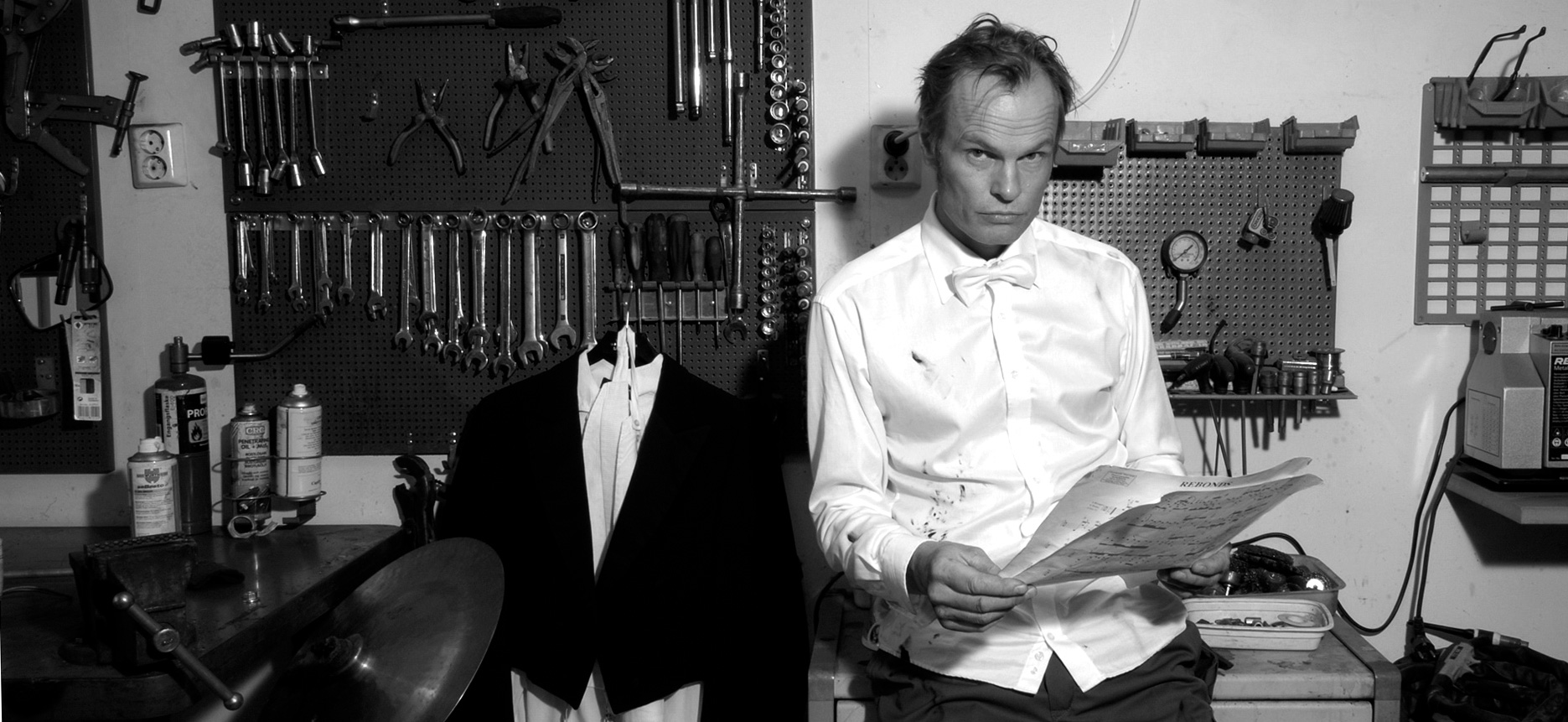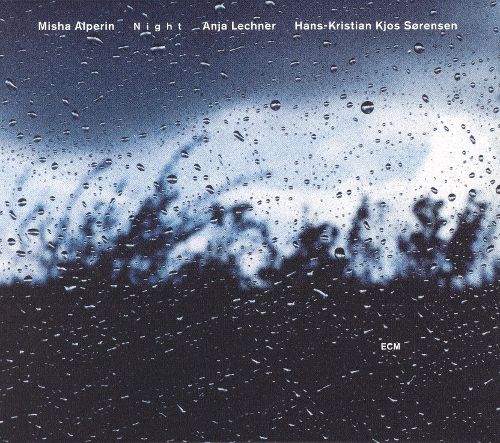In 1998, Ukrainian pianist Misha Alperin was commissioned to write music for the 25th VossaJazz Festival in Norway. “I’d often thought,” says Alperin, “that if I were lucky enough to get one of these jazz festival commissions I’d want to do something unusual in terms of instrumentation and scale.” He’d noted that commissioned works in the jazz arena almost invariably signalled an explosion of bombast – “big gestures, lots of noise, electric instruments, special guest stars, flashing lights on the stage, deejays” – and determined to move in the opposite direction. “One lonely piano, perhaps! It was while I was thinking about this that I had a call from Manfred Eicher.”
The ECM producer was in Oslo at the Rainbow Studio. There, Alperin, a Norwegian resident for a decade now, was introduced to German cellist Anja Lechner and Argentine bandoneonist Dino Saluzzi, working with Eicher on mixes for the Saluzzi/Rosamunde Quartett “Kultrum” album.
“Later, when I was thinking about the commission I thought cello might be a good idea. Anja had said she knew some of my recordings, so there might be a basis for us working together … So I started, step-by-step, to plot a suite in keeping with my original idea of a ‘non-ambitious’, unpretentious music.”
“Night” symbolizes for Alperin the time of day when masks are set aside. “It’s music for those hours when you don’t need to prove anything to the world when the need for self-presentation subsides. At the same time, nature’s exhaling and the meditative feeling is very strong, especially here in the north. “The silence seems more intense”, he says, “and yet it’s rarely totally silent for long. Night is also a time of surprises. You can walk through a silent village and catch a blast of sound from a bar door suddenly thrown open. Or a storm can gather swiftly and without warning. These different aspects of ‘night’ were bound up in my thinking about the work.”
When the pieces were drafted, Alperin headed to Munich to play them through with Anja Lechner. “Manfred listened and we made some corrections and talked, and I wrote some additional things … ” Lechner: “I felt very secure and ‘at home’ in this music straightaway – but then I was familiar with some of Misha’s writing. For him, it was really an experiment, although of course he’s worked for years with the horn player Arkady Shilkloper, who’s also ‘classical’. He knows how to motivate classical musicians who also have some improvising abilities. Almost all of the pieces on ‘Night’ contain improvising, but the ideas and the direction are from Misha.”
Two days before their Norwegian Festival appearance, Anja Lechner and percussionist Hans-Kristian Kjos Sørensen met for the first time. Sørensen had been added to the project on the recommendation of one of Alperin’s fellow teachers at the Norwegian State Academy of Music: “If you’re looking for a classical percussionist who can improvise, and who’s interested in a thousand different things, he’s the one.” Kjos Sørensen also played on Alperin’s album with John Surman, “First Impression.”
Alperin: “The rhythmical cultures of jazz and classical music are so different. The classical drummer has a completely different understanding of ‘time’. If I’d had a jazz drummer on this project I don’t believe he could have realized such a rich dynamic. Hans-Kristian’s dynamic spectrum is very wide.” Anja Lechner: “He’s very sensitive, has much experience working with string players and plays – mostly – very softly, leaving a lot of space.”
And so, on April 4th 1998, the trio of Misha Alperin, Anja Lechner and HKKS gave its first performance of “Night” at the VossaJazz Festival in Voss Idrettshalten, Norway. The concert was recorded for ECM, and also televised. “This music was very warmly received,” Anja Lechner recalls. “Its intimacy and its quietness seemed to be unexpected but also appreciated.”
©ECM
Recommandé par Classica
I loved this album. Captured for us on disc by the redoubtable Manfred Eicher at the Vossa Jazz Festival in Norway, Night was the masterly debut of Ukranian pianist Misha Alperin’s classically-trained trio in April 1998. Alperin’s suite in eight parts is inspired and excellent, recorded hard on the heels of his well-received album First impressions. … The album is splendidly varied and entertaining while retaining its cohesive force. … This is contemporary music at its finest, and Alperin’s signature Slavic melancholy serves him well in his grand tour of world music.
Jennifer Laurie, Jazzreview
is Alperin’s fifth outing for ECM and the work was commissioned for the Vossa Jazz Festival in Norway in 1998. … Alperin has produced a work of quiet intensity that breaks the usual festival commission mould in terms of size and instrumentation. It is an absolute triumph of inverted expectation. … He uses two classically trained musicians to make up his trio: Lechner is the cellist with the Rosamunde Quartett and Kjos Sörensen is principal percussionist with a host of Scandinavian orchestras. Both, however, have improvisational credentials and use them to good effect throughout this recording. The work though is thankfully not a jazz/classical hybrid but represents a foray into the hinterland of both composed and improvised new music.
John Cratchley, Avant
In Oslo lebt der in der Ukraine geborene und in Moldawien aufgewachsene Pianist Misha Alperin. Er hat sich zur Aufgabe gesetzt, den Ton als das Unwahrscheinliche zu behandeln – nicht die Musik schlechthin, nicht die Melodie, vielleicht einen ganz schlichten Akkord, am liebsten aber das Allerwenigste, einen einzelnen Klang. … So dicht sind diese kleinen Kompositionen, so reizvoll ist das Spiel mit den kleinen Abweichungen von den einfachen Formen, so überzeugend ist diese Ästhetik des Verzichts, dass sich der Kitsch, der doch so vertraute Nachbar der modernen Askese, verkrümelt, während sich der Hörer wundert, dass es das alles gibt. Dass sich mit so wenig Mitteln so großartige Musik machen lässt.
Die Münchner Cellistin Anja Lechner tut weit mehr, als nur das Fundament zu legen für die Niederschläge der Pianistentöne. Das Cello ist in diesen Stücken oft das Melodieinstrument. Es darf sogar dahin- und daherschmelzen, und das klingt dann zuweilen, als habe sich ein melancholischer Elch mit einer Tüte Blaubeeren in einem moldawischen Kaffeehaus niedergelassen. Vor allem aber hat Anja Lechner einen Ton, so rund und voll, als sei die Nacht der eigentliche Resonanzkörper ihres Instruments.
Der norwegische Schlagwerker Hans-Kristian Kjos Sørensen ist der Expressionist in diesen Stücken, zwar ein Mann von ebenso großer Präzision wie Vorsicht, doch, wenn es darauf ankommt, von erheblichem Bewegungsdrang. Seine Aufgabe ist die Überraschung, er sorgt für den dynamischen Reichtum dieser Musik, vor allem aber knüpfen seine Töne das Band zur Volksmusik. Worauf es dann mitten in aller Stille plötzlich klopft und hämmert, als hätte irgendein germanischer oder mongolischer Volksglaube bei seinem Untergang vergessen, die winterlichen Dämonen abzuräumen.
Auch diese Verknüpfung erscheint in dieser nördlichen Nachtmusik natürlich: Denn vielleicht, so denkt sich nun der Hörer, kommt die Synkope doch vor dem Takt, und nicht auf den reinen Wohlklang hat es diese Musik abgesehen, sondern auf die Sekunde und die Septime, auf die Intervalle des Drängens, Schiebens und Sehnens. Einen Fall von unerwarteter, geradezu philosophischer Klarheit möchte man dann diese Musik nennen. Und auch einen Fall von feiner Zurückhaltung. Kurz: von Geist, Geschmack und ungewöhnlich guten Manieren.
Thomas Steinfeld, Süddeutsche Zeitung
Der russische Wahlnorweger Mischa Alperin leistet der Nacht Tribut. Jeder Ton seiner Suite Night klingt wie ein funkelnder Stern. Im Trio mit Cello und Perkussion gibt er sich ganz und gar impressionistisch. … Introvertiert und verträumt lässt er das Firmament über sich hinwegziehen und uns daran teilhaben. Einmal mehr entpuppt er sich als Klangmaler mit einem außerordentlich markanten Pinselstrich. So sparsam Alperins Fantasien auch instrumentiert sind, so hypnotisch sind sie doch. Selten bricht der Pianist einmal aus wie eine heiße Quelle, die ihren Weg durchs Eis findet, um sich aber sofort wieder zu disziplinieren. Vielleicht ist es die Verbindung von russischer Seele und norwegischem Klima, die dazu führt, dass er die tiefsten Regionen der menschlichen Gefühlswelt hörbar machen kann, ohne je pathetisch oder gar programmatisch zu werden. Mit Musik wie dieser ist Alperin auf dem besten Weg zu einer ganz neuen, die Fülle der Tradition kreativ einbindenden Kammermusik.
Wolf Kampmann, Jazzthetik
In einer neunteiligen Suite gewinnt Alperin dem Thema „Nacht“ unterhaltsame und nachdenkliche Seiten zwischen Melancholie und intellektueller Tango-Analyse ab. Das Cello, in der Spielweise einer Gesangsstimme ähnlich, übernimmt in weiten Passagen die Melodieführung; Alperin kommentiert oft nur mit kluger Zurückhaltung und tut es hier dem Perkussionisten gleich, der Sounds, aber keinen Swing spielt. Night ist ein faszinierendes Klang- und Melodieerlebnis, Gegenwartsmusik im besten Sinne.
Heribert Ickerott, Jazzpodium
Le jeu de Misha Alperin est un jeu de l’économie, du dépouillement: hormis dans le presque debussyste Second Game, brillant jeu de question/réponse entre violoncelle, piano et marimba, sa virtuosité s’efface volontiers derrière un formidable toucher. Et la musique d’Alperin est à l’image de son jeu, qui choisit de dire beaucoup en peu de notes … L’une comme l’autre explorent de merveilleux horizons via cette confrontation avec deux instruments dont toutes les ressources sonores sont exploitées.
David Sanson, Classica
Nach seinem letzten großartigen Solo-Album At Home überrascht Misha Alperin auf seiner neuen CD Night mit einer „Suite for violoncello, piano, percussion, marimba and claviola in eight parts“, live aufgenommen im April 1998 beim Vossa Jazz Festival in Norwegen. Mitstreiter sind die Cellistin Anja Lechner und Percussionist Hans-Kristian Kjos Sørensen. Night lebt von Alperins ursprünglicher musikalisch thematischen Idee, der improvisatorischen Umsetzung seiner Grundgedanken und dem eigentlichen Spannungsfeld klassischer und freier Interpretation. Die unterschiedlichen Abschnitte der Suite schlagen immer wieder eine Brücke zum Titelthema Nacht: das musikalische, zum größten Teil improvisierte Ergebnis wirkt auf den Hörer ähnlich geheimnisvoll wie nächtliche Dunkelheit. Wer sich die Zeit nimmt, in Alperins musikalischen Kosmos einzutauchen, wird klanglich reich belohnt.
Thomas J. Krebs, Jazz Zeitung
Zu dieser achtteiligen Suite, einer Auftragsarbeit für ein Jazzfestival in Norwegen, zog der Pianist Misha Alperin zwei klassische Musiker mit Improvisationserfahrung hinzu: Anja Lechner, Cellistin des Rosamunde-Quartetts, und den Perkussionisten Hans-Kristian Kjos Sørensen. Am Thema „Nacht“ interessieren ihn die Aspekte der Stille und Intimität, der Offenheit des (musikalischen) Raums und der Überraschung. Wie der Grenzgänger zwischen südosteuropäischem Folk, nordischem Jazz und moderner Konzertmusik beim Live-Mitschnitt seine Partner einbezieht, ist großartig.
Berthold Klostermann, Stereo (s. auch Fono Forum)
Eine achtteilige Suite, Auftragskomposition für ein Jazzfestival in Norwegen und dort live mitgeschnitten. Anstatt für ein spektakuläres Großprojekt entschied sich Pianist Misha Alperin für eine unprätentiöse, kammermusikalische Besetzung, zu der er zwei klassische Musiker mit Improvisationserfahrung hinzuzog: die Cellistin des Rosamunde-Quartetts und einen Schlagzeuger diverser norwegischer Orchester. Am Thema „Nacht“ interessieren Alperin die Aspekte der Stille und Intimität, der Offenheit des (musikalischen)Raums und der Überraschungen. Beispielhaft, wie der Grenzgänger zwischen südosteuropäischem Folk, nordischem Jazz und moderner Konzertmusik seine Partner in den nächtlichen Streifzug einbezieht.
Berthold Klostermann, Fono Forum

